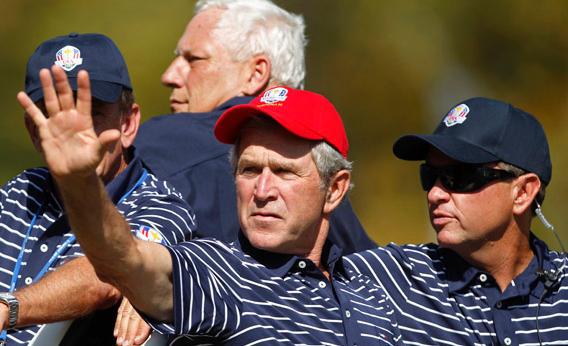“George W. Bush should have been impeached, but it didn’t happen.”
The speaker was North Carolina Rep. Walter Jones, a safe Republican incumbent who has spent years apologizing for his early Iraq War boosterism. (You’ll remember him as the House member who got the cafeteria to rename french fries “freedom fries.”) The venue was the Capitol Hill Club, the quaintly posh hideaway situated between the House of Representatives and the Republican National Committee. The event was the Ron Paul Institute for Peace and Prosperity’s official launch, a sober series of speeches last week from Paul and a few congressional allies. It wasn’t news, per se. Jones always, always talks like this; the Paul movement was always dumping tar and dirt on the Bush legacy.
“There was not the outrage from the American people to have a president who led this country to war without the Constitution,” said Jones, “who led families to cry at funerals, who led moms”—he paused—“I met one whose son has half a body left but is still living!”
This was fringe talk in the Bush years, and it obviously isn’t fully “mainstream.” But since 2008, plenty of conservatives defined themselves by their distance from Bush. Tea Party groups like FreedomWorks dated the movement’s origin not to Obama’s win but to the September 2008 passage of TARP. Out of office, Republicans started to admit that Iraq lacked weapons of mass destruction, that the years between the invasion and the surge were squandered. “We know the past. We know we did wrong,” said new RNC Chairman Michael Steele at the 2009 Conservative Political Action Conference. “My bad.”
The apologists may have peaked. On Tuesday, a Washington Post/ABC News poll finds that 47 percent of all Americans (84 percent of Republicans) finally approve of Bush again, up from 33 percent (68 percent) when he left office. On Thursday, Bush allies will gather at Southern Methodist University for the opening of their friend’s presidential library. Every day, an increasingly influential group of Republicans cop Bush’s rhetoric on taxes and his dream of immigration reform mottled with GOP fingerprints. The Tea Party’s brand replaced Bushism; slowly, definitively, Bushism is taking back its turf.
“My own view is that all the bad stuff is fading in the memory as the conservative movement defines itself in fear of the Obama excesses,” says Dick Armey. For the first two years of Bush’s presidency, Armey was the House Republican majority leader; for most of Obama’s first term, Armey was the chairman of FreedomWorks. “Obamacare, that’s the cornerstone,” he says. “There’s no doubt that the conservative movement known as the Tea Party was born out of disappointment with both parties, but today the compelling concerns are the excesses of liberalism with Obama and how the next two years would be if he won the House back.”
Tribal political loyalty explains plenty of the rapprochment. Washington Republicans turned on the guy, Tea Party leaders criticized his trespasses, but the base never deserted him. Even during the failed immigration reform pushes of 2006 and 2007, the red-hottest anger got directed at Sens. John McCain and Lindsey Graham. In early 2010, when no Republican running for office would have clung to Bush, a mysterious group of “small businessmen” were buying billboards on Bush’s behalf. The 43rd president leaned into frame, waving and smiling goofily; a loud yellow slogan yelled “MISS ME YET?”
The Tea Party itself was delicate when it came to Bush-bashing. (The Paul movement, which has only grown since 2008, was always the exception.) In February 2010, a Tennessee lawyer named Judson Phillips put on a miraculously successful National Tea Party Convention, and he became, for a while, a movement spokesman. “The Tea Party movement does not defend George W. Bush,” said Phillips in February 2010, promoting the convention. “George W. Bush is not exactly one of my favorite people.”
Today, Phillips follows the “Obama was worse” line. “The one factor, other than just the passing of time that is helping Bush,” he says, “is the way people remember the economy of the Bush years versus what I like to call the Great Obama Depression. If you compare the Bush economy to the Obama economy, I think a lot of people look back wistfully saying, ‘I was better off 10 years ago than I am today.’ ”
That attitude has saved many a president from the judgment of contemporary pundits. It has restored Bill Clinton, for example, as a generally well-liked politician who made a couple of stupid mistakes. Clinton, who’d been impeached, was being restored in the public memory; Bush, who’d merely presided over seven years of war and the start of a recession, wasn’t bouncing back. That was untenable. “Many of [Bush’s] supposed failures are mild compared to the current president (e.g. spending, debt),” wrote Jennifer Rubin, reacting to the glowing Washington Post/ABC poll. “Unlike Obama’s tenure, there was no successful attack on the homeland after 9/11 … the essence of his view on Islamic terror—that we are at war with those espousing a jihadist ideology—has been confirmed, painfully so.”
Why start the “terror clock” after 9/11? Pure necessity. You can convince people, over time, that Bush’s economic record was better than they remembered. The two land wars are tougher to explain away. You can argue that they were going perfectly well until Barack Obama arrived. Or you can say that Bush was wrong.
“The problems with the neo-cons and with the sort of nation-building notions … they were difficult for most people,” says Armey. “But I do believe that that probably is going to be the Bush presidency’s longest-term hangover. Look at the fact that, today, Iran has a greater influence over circumstances in Iraq than we do. We paid a heck of a high cost to put Iran in such an advantageous position with respect to Iraq.”
